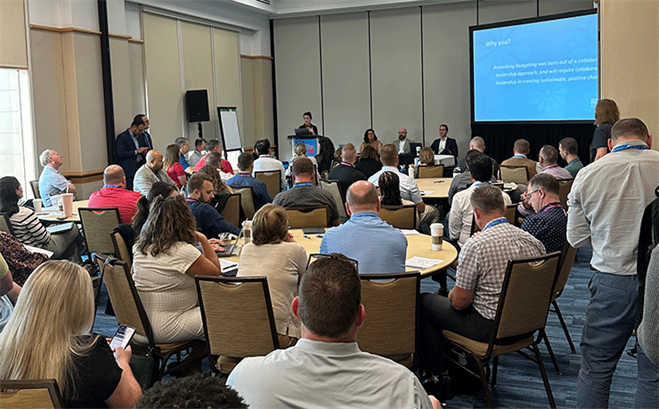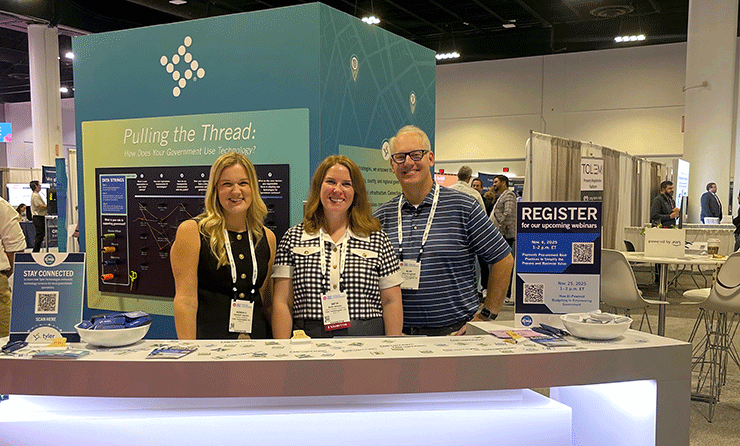4 Key Takeaways From the 2025 ICMA Annual Conference
November 06, 2025 by Craig Patton

The 2025 ICMA Annual Conference in Tampa, Florida, brought together local government leaders, innovators, and technology partners to explore the evolving landscape of public service. This year’s event highlighted how data-driven tools, resilient strategies, and collaborative partnerships are helping cities and counties better serve their communities.
As an ICMA Strategic Partner, Tyler Technologies joined this year’s conversations to share practical insights and examples that help local governments make smarter, data-informed decisions. Here are four key takeaways from the conference.
AI Technologies Can Optimize ROI
One major theme was how artificial intelligence (AI) is reshaping the way governments understand and optimize their budgets. In his session “Unlock Actionable Budgeting Recommendations to Optimize ROI,” Chris Fabian, senior director of product strategy for ERP budgeting at Tyler, revealed how responsible use of AI within the priority-based budgeting framework can quickly translate line-item data into meaningful program insights.
Using real-world examples, Fabian showed how AI tools can be used to analyze general ledger data, forecasting program costs and revenue potential to evaluate how each aligns with organizational priorities. This automated groundwork gives finance teams a head start on building data-rich, strategic budgets — making the budgeting process dramatically more efficient and impactful.
Fabian shared that, in 2021, 25 organizations using priority-based budgeting identified over $73 million in resource reallocation opportunities, and over $8 million entrepreneurial revenue-generating opportunities.
Strategies for Resilience Strengthen Operations
Operational resilience was another major focus at the conference, especially as governments navigate rising risks in the digital payment landscape. In her session “Mitigating Government Payment Fraud: Strategies for Resilient Operations,” Morgan Jines, vice president of Payments at Tyler Technologies, shared research showing that payment fraud is steadily increasing across the public sector, driven by faster payment systems, decentralized processes, and sophisticated impersonation tools such as AI-generated deepfakes.
Jines outlined a framework spanning People, Process, Technology, and Collaboration & Compliance to help agencies strengthen their defenses. Real-world examples illustrated how cities are putting these principles into action — from a Pennsylvania city that responded to a fraud attack by implementing dual approval and call-back procedures to prevent repeat incidents, to a Texas city that reduced fraudulent card testing attempts by 90% after implementing velocity controls and fraud monitoring on its utility portal.
She also emphasized the importance of working with PCI DSS Level-1 compliant technology providers, enabling tokenization and encryption, and conducting regular vulnerability scans to ensure continuous protection. For agencies looking for a starting point, Jines recommended a practical 30/60/90-day roadmap: assess risks and educate staff, establish processes and training, and then implement and refine controls.
Aligning Fiscal Management and Community Priorities
One of the most compelling discussions came from a panel discussion exploring how smaller communities are putting the Government Finance Officers Association (GFOA) Rethinking Budgeting principles into practice. Through innovative budgeting strategies that align fiscal management with community priorities, these governments are fostering transparency and sustainable economic development.
The panel was comprised of members of the Rethinking Budgeting Trailblazers Group — a collaboration of local government practitioners, researchers, and technology partners — including Tyler’s Chris Fabian. The group is translating GFOA’s Rethinking Budgeting guidance into a community of practice that helps government organizations ensure short-term economic agility and long-term resilience in the face of rapid change.
Reliable Technology Partners Drive Government Success
Finally, a recurring theme at this year’s conference was the importance of trusted partnerships in helping governments modernize effectively. Discussions and presenters highlighted how partnerships are enabling more secure, scalable, and cost-efficient operations through technology solutions.
ICMA’s annual conference continues to strengthen connections between government professionals and technology partners. Through ongoing collaboration, Tyler remains committed to helping communities modernize operations and deliver better outcomes for residents.
